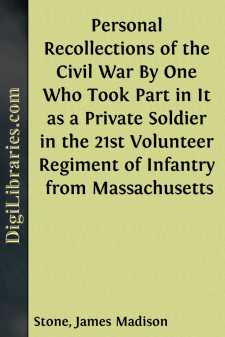Categories
- Antiques & Collectibles 13
- Architecture 36
- Art 48
- Bibles 22
- Biography & Autobiography 813
- Body, Mind & Spirit 142
- Business & Economics 28
- Children's Books 17
- Children's Fiction 14
- Computers 4
- Cooking 94
- Crafts & Hobbies 4
- Drama 346
- Education 46
- Family & Relationships 57
- Fiction 11829
- Games 19
- Gardening 17
- Health & Fitness 34
- History 1377
- House & Home 1
- Humor 147
- Juvenile Fiction 1873
- Juvenile Nonfiction 202
- Language Arts & Disciplines 88
- Law 16
- Literary Collections 686
- Literary Criticism 179
- Mathematics 13
- Medical 41
- Music 40
- Nature 179
- Non-Classifiable 1768
- Performing Arts 7
- Periodicals 1453
- Philosophy 64
- Photography 2
- Poetry 896
- Political Science 203
- Psychology 42
- Reference 154
- Religion 513
- Science 126
- Self-Help 84
- Social Science 81
- Sports & Recreation 34
- Study Aids 3
- Technology & Engineering 59
- Transportation 23
- Travel 463
- True Crime 29
Personal Recollections of the Civil War By One Who Took Part in It as a Private Soldier in the 21st Volunteer Regiment of Infantry from Massachusetts
Description:
Excerpt
Chapter I
LEARNING TO BE A SOLDIER
Leaving Camp Lincoln for the front. At Baltimore, Maryland. Cantaloupes and Peaches. Annapolis, Maryland. Chesapeake Bay oysters. Assisting negroes to escape. Doing picket duty on the railroad. A Negro husking. Chaplain Ball arrives from Massachusetts. Assigned to the 2d Brigade, 2d Division, 9th Army Corps.
During the winter of 1860 and 1861 there was great uneasiness felt in the North. The South, through the democratic party, had been the ruling section of the country most of the time since the establishment of the Republic, but at the time of the election in the autumn of 1860 a northern political party had won. That party was not only a northern party, but it was an abolition party. The election of an abolition president, Mr. Lincoln, by the North, was at once regarded as a menace to the slave holding interests of the South, which section at once began to make preparations to withdraw from the Union. As the spring months passed and Mr. Lincoln, the new president, took his seat, secession was more and more talked about. Soon the 6th Massachusetts Regiment was attacked in Baltimore. Fort Sumter in Charleston Harbor was fired upon. Battalion after battalion of the state militia were being hurried away south for the protection of the Capitol. It thus became more and more apparent that there was to be war, and the all-important question from the northern viewpoint was, the preservation of the Union. One Sunday in the month of June I went home to visit my family, I being at the time at work away from home, and while there, quietly asked my mother what she would say if I should enlist. Well, that question produced a shock, and was not answered as quietly as it was asked. I was told I could not enlist without her consent, which she should not give, and I was heartily laughed at by my brothers and sisters. However, when it became known that a company was being recruited at Barre, I went quietly over there and enlisted, then I went home and told the family what I had done. There was a rumpus, of course, but it passed off, and after a few days, hearing nothing from the company, I decided to go back to work again and await developments. On the 22d I learned that the company was going into camp at Worcester the next day. I was on hand and went along.
A number of stage-coaches were provided to take us to Worcester. It was an interesting and picturesque ride of a little more than twenty miles. Arriving in Worcester early in the afternoon, we went to the Agricultural Fair Grounds, which had been converted into a campground and named Camp Lincoln from Levi Lincoln, the first mayor of Worcester and a Governor of Massachusetts, and set to work putting up tents and forming a company street. Sleeping in tents, drilling and doing guard duty seemed strange at first, and was a good deal of a change from the duties of a farmer’s boy, but it was interesting to be among a lot of live young men who were brimful of enthusiasm, patriotism and fun....


